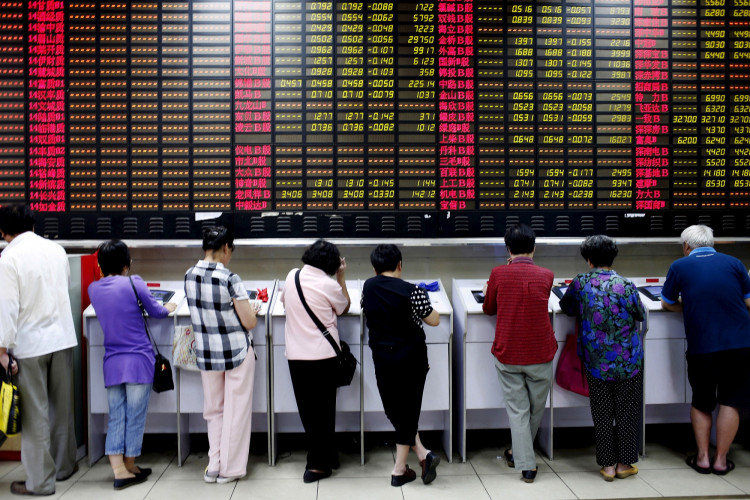Chinese stocks edged closer to a technical correction on Wednesday, reflecting growing investor frustration over Beijing's delayed rollout of economic stimulus measures. The CSI 300 Index, a benchmark tracking top companies listed in Shanghai and Shenzhen, fell 0.6%, taking its decline since October 8 to nearly 10%. Meanwhile, the Hang Seng Index in Hong Kong experienced volatile trading before managing a modest 0.4% gain in late afternoon trading.
The market has faced intense swings since late September when optimism over central bank stimulus measures initially sparked a surge. That optimism, however, is rapidly dissipating as Beijing remains vague about its fiscal plans. "This historic surge in momentum at the end of September is, of course, unsustainable," said Marvin Chen, a strategist at Bloomberg Intelligence. He noted that while the Chinese government's policy moves are trending positively, the fast-paced rise and fall of the market reveal ongoing volatility.
The CSI 300 index had rallied over 30% in just three weeks from mid-September, only to lose steam as investors remain divided on the market's future. A recent survey conducted by BofA Securities from October 4 to 10 highlighted that nearly half of the respondents saw a 10% upside for Chinese offshore stocks over the next six months. However, another third expected gains of up to 20%. Despite this, 75% of those surveyed said the market is undergoing a "structural de-rating," underscoring widespread skepticism.
A focal point for investors remains China's troubled property sector. The sector, which has been at the heart of China's economic challenges, saw shares fluctuate wildly as policy expectations shifted. The next pivotal moment for the market will be a press briefing by Housing Minister Ni Hong on Thursday, where he is expected to detail measures aimed at stabilizing the property market. Ahead of the announcement, a Bloomberg Intelligence gauge of developer shares jumped as much as 10%, reversing a 7% decline from the previous day.
Analysts are cautious about the upcoming briefing. "The last two pressers by the National Development and Reform Commission and the Ministry of Finance were disappointing, so there should be no reason to lift hopes for the briefing tomorrow," said Vey-Sern Ling, managing director at Union Bancaire Privée. Investors have grown wary as previous government statements failed to provide the clarity needed to boost confidence.
Elsewhere, global markets were shaken by disappointing earnings from European luxury and tech heavyweights. LVMH, often seen as a bellwether for Chinese consumer demand, reported weaker-than-expected third-quarter sales, sending its stock tumbling by the most in a year. The news weighed down the CAC 40 index in Paris, which fell 0.5%. The broader STOXX 600 index also dropped by 0.2%.
Another tech giant, ASML, a critical supplier for chipmakers like TSMC and Samsung, issued a gloomy sales forecast for 2025, citing continued weakness in the semiconductor market outside of artificial intelligence applications. The company's shares plummeted, marking their most significant drop in nearly 30 years. The ripple effect was felt across Asia, with key indices in Japan, Taiwan, and South Korea falling as the sector faced renewed pressure.
The broader Chinese tech sector also faced headwinds. A Bloomberg report indicated that U.S. officials are considering a cap on export licenses for AI chips to certain countries, a move that sent shockwaves through the semiconductor industry. This news added to the unease, leaving investors cautious about the future direction of tech stocks in both the U.S. and Asia.
The global market is bracing for further volatility as earnings season continues. In the U.S., S&P 500 and Nasdaq futures remained flat, signaling a tentative opening for Wall Street. Market strategist Michael Brown of Pepperstone noted that while dips could present buying opportunities, the upcoming U.S. election and geopolitical risks may heighten market jitters. "I expect investors to become increasingly twitchy as we head towards November 5th, and keen to book profits at frothy levels," he said.
Meanwhile, the U.S. dollar maintained its strength, buoyed by expectations of a slower pace of rate cuts by the Federal Reserve. The U.S. dollar index, which tracks the currency against six others, remained near its highest level since early August, supported by strong economic data. The euro, on the other hand, traded at a two-month low as investors awaited the European Central Bank's policy meeting on Thursday.
Oil prices also experienced pressure, extending losses from the previous day. Uncertainty over the Middle East conflict and its potential impact on global supply contributed to Brent crude futures falling 0.6% to $73.78 per barrel, while U.S. crude futures slipped 0.7% to $70.12.




